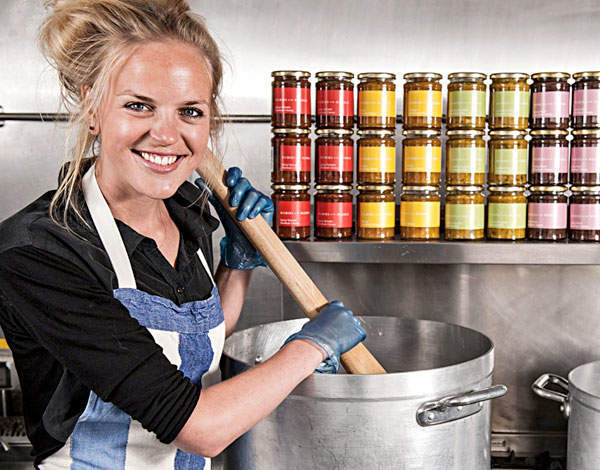

Food waste is an issue close to my heart. I hate seeing food going in the bin – it is simply wasteful, especially as it can so often be avoided. Carefully planning your meals helps to reduce waste as does having a little imagination when you look in the fridge and see just a few, somewhat forlorn leftovers.
Jenny Dawson, founder of Rubies in the Rubble, created her company to help tackle the issue of food waste by turning rejected produce (tomatoes that were too small, carrots that are too curly) into jams and chutneys. She has been nominated for this year’s Veuve Clicquot New Generation award for her innovative approach to finding a solution to food waste and in today’s Food Friday she shares her thought on jam, reducing waste and getting creative.
In 2011 a left my job in a hedge fund to start what people thought was a crazy notion: creating a first-class delicious food brand from surplus. I had a vision to create a brand that both addressed and raised awareness about unnecessary food waste. I called it Rubies in the Rubble.
‘Rubies in the Rubble’ uses fresh fruit and veg, which would otherwise go to waste, to make delicious food products. We make our products from what are known as ‘out grades’ – curly cucumbers, tiny peppers, soft tomatoes – that have failed to meet supermarket specifications and can represent over 20 per cent of a farmer’s crop.
Globally just under 1 billion people go hungry yet we throw away a third of the food we produce (ample amounts to feed those in need). At the same time we are chopping down forest areas to grow more – panicking over increasing food demands and growing populations. There must surely be a cleverer solution.
You could think I was bonkers and wonder how reducing our food waste in the UK could help food impoverished communities overseas but with the majority of food being bought on the global market, our food demand (consumed and wasted) affects how much is left in the market. So simply, if we wasted less we would demand less and keep more on the market for others.
As an example of the scale of the problems connected to food waste, if we were to simply plant trees on land currently used to grow unnecessary surplus and therefore wasted food, this would theoretically offset 100 per cent of the current greenhouse gas emissions from fossil fuel combustion. Similarly, with the 40 million tonnes of food wasted in the US alone there would be enough to satisfy the hunger of every one of the one billion malnourished people in the world today.
There are many reasons for food waste on various levels – consumer attitudes, aesthetic standards, government policies, packaging, storage and transportation. However, in the UK the majority of food wasted occurs in the home, which empowers us all to be able to make a change.
Making preserves is one easy and a very traditional British way of saving – which is why the first products we launched were a range of chutneys and jams. But it requires a group effort: we should all start to eat in season, plan our shops, use our freezers and get creative with our leftovers.






